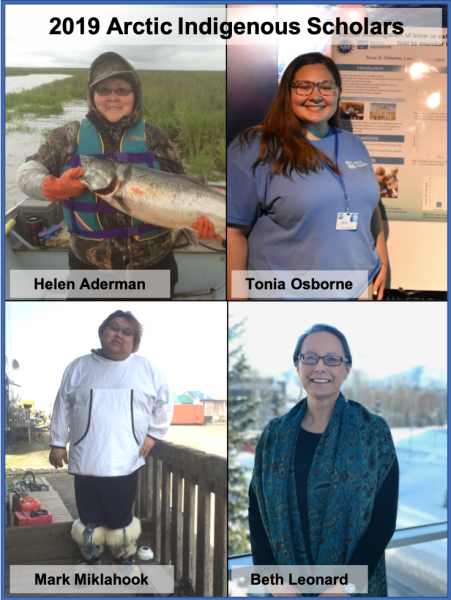Meet the 2019 Arctic Indigenous Scholars

Helen Aderman
Helen Kegginarrluk Aderman is Yup’ik born in Togiak, Alaska, from Aleknagik, Alaska. She is the Bristol Bay Native Association’s Marine Mammal Manager, based in Dillingham, and the Executive Director of the Qayassiq Walrus Commission and Bristol Bay Marine Mammal Council. She holds a B.A. in Rural Development from University of Alaska Fairbanks. Helen is working to address impacts on marine mammal habitat use areas and to ensure future Alaska Native generations will have continued access to their traditional marine foods for harvest. While in D.C., Helen hopes to work with federal stakeholders on resolving unique remote Alaska Native issues in establishing long-term marine ecosystem habitat protective measures.
Beth Leonard
Beth Ginondidoy Leonard is professor and director of the Alaska Native Studies Program at the University of Alaska Anchorage. She is Deg Xit’an (Athabascan) and member of the Shageluk Tribe of interior Alaska; her parents are James, and the late Jean Dementi. In 2014, she was awarded a Fulbright U.S. Core Scholarship and spent five months at Te Kawa a Māui – School of Māori Studies at Victoria University of Wellington (VUW). During that time, she taught a joint University of Alaska-VUW videoconference with Dr. Ocean Mercier, and researched Māori student recruitment, retention, and mentoring. Beth is a member of the Alaska Native Studies Council, and UArctic Indigenous Issues Committee. Her current research investigates the confluences of Indigenous methodologies, knowledges, and pedagogies in shaping Indigenous spaces in higher education.
Mark Miklahook
Mark Sivukrak Miklahook, III is St. Lawrence Island/Siberian Yupik from Savoonga, Alaska in the Bering Strait. As an Arctic Indigenous scholar, Mark hopes to address the importance of teaching Native Alaskan languages in village schools, how his community uses traditional food to continue their subsistence traditions, and how climate change is shortening winters and affecting hunting/subsistence activities. He is actively engaged in efforts to improve his community, such as the Alaska Community Action on Toxins, the Bering Sea Women’s Group, and volunteering with the Alaska Rural Veterinary Clinic. Mark will use this opportunity to represent the voice of the Siberian Yupik people of St. Lawrence Island, who are often underrepresented in government discussions and policy decisions that are made in Washington D.C.
Tonia Osborne
Tonia Qanannaq Osborne is Inupiaq from the village of White Mountain, Alaska but she also grew up in Nome. She is a senior at the University of Alaska Southeast in Juneau where she is studying marine biology. Tonia is an Alaska Native Science and Engineering Program (ANSEP) university success student as well as a Caleb Pungowiyi Scholar. As an undergraduate, she is very involved with research with marine mammals through an REU (Research Experience for Undergraduates) program at Mystic Aquarium. Tonia will continue to do research with her university until she graduates. She is very interested in incorporating traditional knowledge from hunters, villagers, and elders in scientific research as the Arctic is experiencing amplified effects of climate change.
Washington, DC Meeting Hosts
Thank you to the following organizations for hosting 2019 Arctic Indigenous Scholars: U.S. Global Change Research Program, Interagency Arctic Research Policy Committee, Office of Science and Technology Policy, Smithsonian Arctic Studies Center, The Arctic Institute, National Oceanographic and Atmospheric Administration, National Science Foundation, Senator Lisa Murkowski, Senator Dan Sullivan, U.S. Department of Education, U.S. Bureau of Indian Education, National Congress of American Indians, and National Council for Science and the Environment.
2019 Volunteer Selection Committee
Rosemary Ahtuangaruak, 2018 Arctic Indigenous Scholar
Raychelle Daniel, The Pew Charitable Trusts, Washington, D.C.
Craig Fleener, ARCUS Board of Directors
Theresa Arevgaq John, University of Alaska Fairbanks, 2018 Arctic Indigenous Scholar
Inuuteq Stotts, ASRC Energy Services
2019 Products and Resources
Seminar Recording - Presented by Arctic Indigenous Scholar, Helen Aderman, at the U.S. Global Climate Research Program office in Washington, D.C. on Monday, 6 May 2019.
Title: The Bristol Bay Marine Ecosystem & Subsistence Resource Needs
